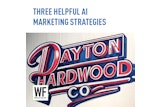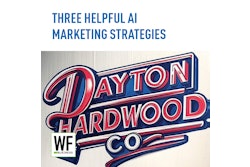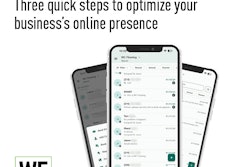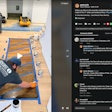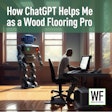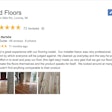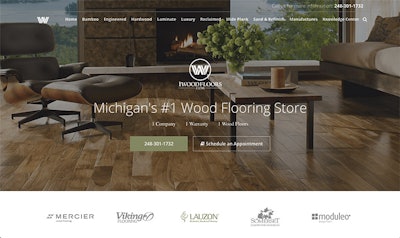
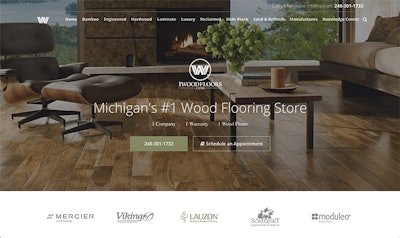 Finding out more about web design gave me the confidence to try it myself.
Finding out more about web design gave me the confidence to try it myself.
When I opened my store in my early 20s after working as a contractor, I quickly learned how much I didn't know. I was so uninformed about web design that I ended up paying for things that didn't work out the way they should. But part of my personality is that if something's not done right, I'm going to do it myself. I got motivated to dig in and find out how to do it. I didn't expect it to turn into a passion along the way, but it did, and I ended up founding a website development company with my brother. It wasn't easy, but in the end, it was invaluable for growing my wood flooring business.
It started with getting the right design
My first experience with a web designer didn't go great; I just was not happy with the way it was turning out. I went through half a project with that designer and then switched to another. I thought the second one was great … but only compared with the first. The process made me want to get better at web design myself, and I started really studying and exploring it. There are a lot of great Facebook groups about design, and there is no shortage of information on the internet. Learning more gave me the confidence to be more specific with the direction of the website, and I began to take over the design.
A website is all about ease of use, and you have to think like the consumer. Ensuring our site was mobile-friendly (meaning it adjusts for a phone or tablet) was an important step early on (this was about 10 years ago, and mobile was just becoming a thing). Another rule I gleaned from my research was to put the service or product that is most profitable to my business on the home page. Everyone who visits is going to see it, and that all starts with a good design.
I focused on strengthening my online reputation
Once I started studying design, I realized there were a million other interconnected things I needed to know, and it only got more complicated (but was also a fun challenge). The next step was strengthening my online reputation. The internet is all about credibility, and you can begin gaining that by registering your business with Google, Yelp, HomeAdvisor, Angie's List and anywhere else you can. Online reviews are the new word-of-mouth. There are companies that specialize in making sure your business is listed and all the citations are done correctly; if you don't have time to do it yourself, it's worth paying someone to make sure these are up to speed.
I dove into my site's SEO
Once I had this basic setup, I looked at the way my website was built and dove into my SEO, which is made up of meta tags, titles and descriptions on the website. These are all things Google looks for when searching for pages. You want to base your page's content off of what people are looking for, so do your keyword research, finding out what terms people are typing in to find you. Of course, there are tools for that, as well.
There is obviously a ton of information you want to share with clients, but there are professional content writers who can take that information and write it for the consumer. One thing I learned the hard way is that sometimes the best content writer is not the best web designer, and vice versa. It can be good to have specialists in each field (programming, SEO, content writing) developing your site with you.
When you have your title tags and meta-descriptions optimized, your website should also have links leading to it from other reputable sites. If I have a link to a credible site, Google will give more credit to that link than it would another link. This is a great way to build your online presence, but if you hire an SEO company to take care of it, make sure they don't use "black hat" tactics. With black hat tactics, your links are not credible, but there's a ton of them helping boost your website. I've always preferred to go with "white hat" tactics, which means having reputable links that are industry-specific from other reputable sources.
RELATED: How One Contractor Uses Houzz.com to Build Business
I built an authentic audience on social media
If you're using Pinterest, Instagram, Facebook, Houzz or other platforms, they all link to your website and help it climb up the search engine.
On Facebook or any social media platform, you're building an audience you basically are performing to. If you have an ideal client who is, say, 60 years old, retired and lives in a particular area, you can specifically market your work to them so it shows up in their newsfeed.
There are companies that will market your social media with generic ads and some general posts, but I'm picky about how things come across, and I like to put our real work on social media myself. It's not about pushing an ad to random people; it's about building your audience first. If you're doing something where you're getting a lot of fake likes on Facebook, that does no good for your business, and Google recognizes when you do things with integrity.
I explored SEM options (avoiding lead generation companies)
There are also tons of search engine marketing (SEM) options available. Google AdWords has been one of my favorites, but recently I've found I'm reaching more people with social media than paid ads—a big shift.
Some people pay for leads from lead generation companies, but I feel all you're doing is paying your competitors to be your competitors. When you do solo marketing, you're not giving money to a company that's marketing the same lead (rarely ever a qualified lead) to three other contractors.
I began to really enjoy the process
While some of these lessons were costly, getting educated about web design and marketing had an immediate impact on my business and is still the key to its success to this day. If that wasn't reason enough, I also found I really enjoy the process. Understanding the fast-changing world of internet marketing is so important, and that part keeps me motivated. There's still a lot I have to learn, but I've found that if you're always looking at the next step, you're never playing catchup.










